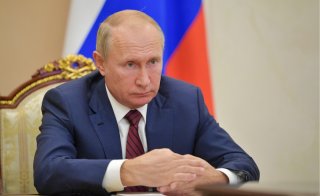Vladimir Putin Is Trapped
The Putin regime is baring its fangs and revealing its weakness in the process. First to be killed was the leader of the democratic opposition, Alexei Navalny. Next came Maxim Kuzminov, a helicopter pilot who defected to Ukraine in August 2023
The Putin regime is baring its fangs and revealing its weakness in the process. First to be killed was the leader of the democratic opposition, Alexei Navalny. Next came Maxim Kuzminov, a helicopter pilot who defected to Ukraine in August 2023. At the same time, two groups of Ukrainian POWs, one near Avdiivka and one near Robotyne, were mowed down after surrendering and throwing down their weapons.
Navalny’s murder is well known. He may have been beaten to death; he may have been poisoned; he was definitely condemned to death by being transferred to a notorious prison colony in Russia’s inhospitable far north. What Russia’s illegitimate president failed to realize is that, in killing Navalny, he created a symbol and a martyr that will haunt him until his dying days. Only a feeble-minded leader would think that murdering a weakened dissenter wasting away in his Gulag could be of advantage to his regime.
Lest there be any doubt as to the regime’s responsibility for Navalny’s death, Putin promoted Valery Boyarinev, the first deputy director of the FSIN, the federal agency responsible for carrying out sentences, to the rank of colonel-general, presumably for a job well done. According to human rights activists, Boyarinev also oversaw the killing of hundreds of Ukrainian prisoners of war.
Kuzminov’s murder is less well-known but no less important. The 28-year-old Russian was stabbed twelve times and run over in a car in Spain—hardly the victim of a random mugging or a professional hit by organized criminals. His death was intended to convey to potential defectors just what awaited them if they chose to flee to the Ukrainian side. The Director of Russia’s Foreign Intelligence Service, Sergei Naryshkin, effectively took credit for the killing by stating that “that traitor and criminal became a moral corpse in the moment that he planned his dirty and terrible crime.”
Once again, both Putin and Naryshkin failed to see that, although Kuzminov’s brutal death would certainly intimidate many potential defectors, it also showed just how fearful the regime was of potential defection by growing numbers of Russians who would prefer not to go to certain death in Ukraine and thereby contribute to one of Putin’s proudest achievements—the pointless destruction of several hundred thousand Russian soldiers.
As to killing Ukrainian POWs, it’s been a while since Russia has practiced that transgression against international law. But, once again, although Putin and his sidekicks probably consider such flouting to be a sign of strength, it is in fact the opposite. Self-confident regimes and armies don’t need to act as savages. They can just win. Desperate armies that are frustrated by their inability to do more than capture several hundred meters of rubble can take out that frustration on unarmed adversaries and thereby get some satisfaction. Since Russia apparently sacrificed 16,000 men in its attempt to capture Avdiivka, one can appreciate that the frustration and aggression among the rank and file must be great.
In a turn of events, a young Russian military blogger and Putin supporter, Andrei Morozov, committed suicide after bemoaning the enormous casualties Russia had suffered and being condemned thereafter by Putin’s pet propagandists, Yulia Vityazeva and Armen Gasparyan, who called his post a “piece of ****, promoting defeatist ideas.” Morozov’s suicide note accused the “political prostitutes” who criticized him as being “too chicken**** to pull the trigger themselves.” In a bizarre logical jump, Morozov then concluded, “Well, I'll do it myself. I'll shoot myself if no one dares to take on this petty business.”
Morozov’s death certainly testifies to cracks in Putin’s propaganda machine. It may also foreshadow the path desperate Russian soldiers who want to defect but don’t dare to may be increasingly inclined to take.
It’s possible that the Putin regime’s turn toward Nazi-like savagery is testimony to its strength or, at the least, to the Kremlin’s self-confidence. Far more likely, the violence is testimony to the bumbling, fearful nature of the Putinite system and to the dictator’s delusions of grandeur.
Why turn to barbarity now? After all, if Western doomsayers are to be believed, the Kremlin is brimming with confidence, the Russian army is unstoppable, and Ukraine is slated for defeat. Unless, of course, the doomsayers are wrong, and the war isn’t going quite as well as the Kremlin insists—16,000 dead soldiers are a helluva lot of dead soldiers to be sacrificed in the taking of a strategically secondary town—and the regime isn’t quite as strong as the doomsayers believe.
Consider the alternative. The Russian bear is cornered. Its violence and bloodthirstiness are signs of desperation, not of triumph.
About the Author
Dr. Alexander Motyl is a professor of political science at Rutgers-Newark. A specialist on Ukraine, Russia, and the USSR, and on nationalism, revolutions, empires, and theory, he is the author of 10 books of nonfiction, including Pidsumky imperii (2009); Puti imperii (2004); Imperial Ends: The Decay, Collapse, and Revival of Empires (2001); Revolutions, Nations, Empires: Conceptual Limits and Theoretical Possibilities (1999); Dilemmas of Independence: Ukraine after Totalitarianism (1993); and The Turn to the Right: The Ideological Origins and Development of Ukrainian Nationalism, 1919–1929 (1980); the editor of 15 volumes, including The Encyclopedia of Nationalism (2000) and The Holodomor Reader (2012); and a contributor of dozens of articles to academic and policy journals, newspaper op-ed pages, and magazines. He also has a weekly blog, “Ukraine’s Orange Blues.” The author's opinions are his own.


